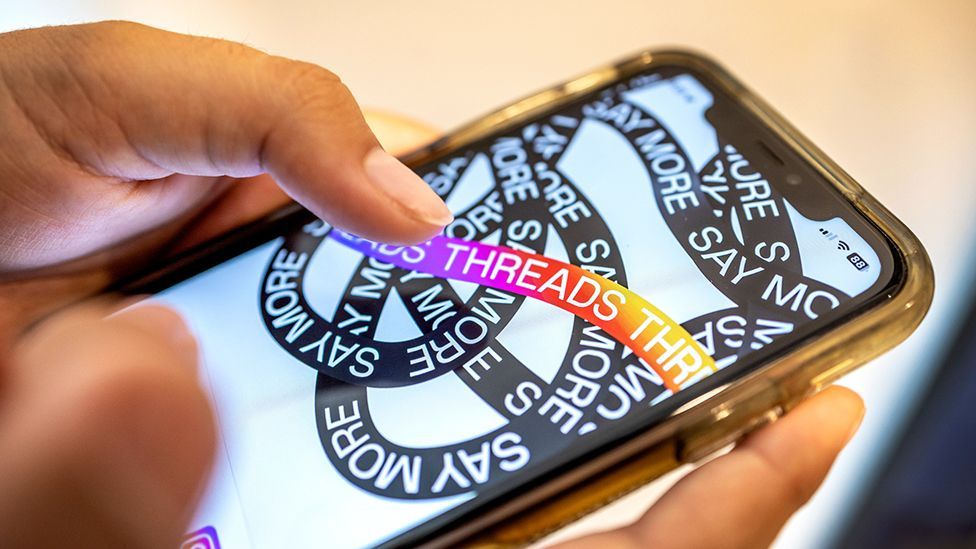
By Bernd Debusmann Jr
BBC News, Washington DC
Twitter is considering legal action against Meta over its fast-growing rival app Threads.
Threads, which was launched to millions on Wednesday, is similar to Twitter and has been pitched by Meta bosses as a “friendly” alternative.
Twitter’s Elon Musk said “competition is fine, cheating is not” – but Meta denied claims in a legal letter that ex-Twitter staff helped create Threads.
More than 30 million people have signed up for the new app, according to Meta.
That is less than a tenth of the estimated 350 million users on Twitter, according to Statista.
According to an SEC filing from 2013, it took Twitter four years to build the same number of users that Threads gained in a day – though Twitter grew its userbase from scratch, while Threads was able to tap into the pre-existing two billion monthly users Meta says Instagram has.
The look and feel of Threads are similar to those of Twitter, BBC News technology reporter James Clayton noted. He said the news feed and the reposting were “incredibly familiar”.
But US copyright law does not protect ideas, so for Twitter to be successful in court it would have to prove that its own intellectual property, such as programming code, was taken.
And in 2012 Meta was granted a patent for “communicating a newsfeed” – the system that displays all the latest posts when you use Facebook.
In a move first reported by news outlet Semafor, Twitter attorney Alex Spiro sent a letter to Meta CEO Mark Zuckerberg on Wednesday accusing Meta of “systematic, wilful, and unlawful misappropriation of Twitter’s trade secrets and other intellectual property” to create Threads.
Specifically, Mr Spiro alleged that Meta had hired dozens of former Twitter employees who “had and continue to have access to Twitter’s trade secrets and other highly confidential information” that ultimately helped Meta develop what he termed the “copycat” Threads app.
“Twitter intends to strictly enforce its intellectual property rights, and demands that Meta take immediate steps to stop using any Twitter trade secrets or other highly confidential information,” the letter says.
“Twitter reserves all rights, including, but not limited to, the right to seek both civil remedies and injunctive relief without further notice.”
BBC News, which has seen a copy of the letter, has contacted both Meta and Twitter for comment.
Mr Musk said that “competition is fine, cheating is not” in response to a post on Twitter that referred to the legal letter.
On Threads, Meta spokesperson Andy Stone posted that “no one on the Threads engineering team is a former Twitter employee – that’s just not a thing”.
Sarah Kunst, managing director at venture capital firm Cleo Capital, told the BBC’s Today programme Threads could offer a “brand-safe environment” for existing Instagram advertisers who “feel they can allocate some budget and see what happens”.
She added that while the app reaching 30 million users could be the result of an initial rush, it will likely see a steady increase in users.
“They’ve made it very easy to cross-post to other platforms like Instagram, so I think that we’ll continue to see growth,” she said.
Both Mr Musk and Mr Zuckerberg have acknowledged the rivalry over Threads, which is linked to Instagram but works as a standalone app.
As it launched in 100 countries, Mr Zuckerberg broke more than 11 years of silence on Twitter to post a highly popular meme of two nearly identical Spider-Man figures pointing at each other, indicating a stand-off.
Shortly after, and as the word “Threads” trended globally on his platform, Mr Musk said: “It is infinitely preferable to be attacked by strangers on Twitter, than indulge in the false happiness of hide-the-pain Instagram.”
Twitter CEO Linda Yaccarino said in a tweet on Thursday that while the platform, is “often imitated” it “can never be duplicated”.
Both Meta and Twitter have undertaken significant layoffs this year, with Meta announcing in April that it would cut staff levels by approximately 10,000.
Twitter lost a large proportion of its 7,500 employees, as high as 80%, in waves of redundancies following Mr Musk’s takeover last October.








